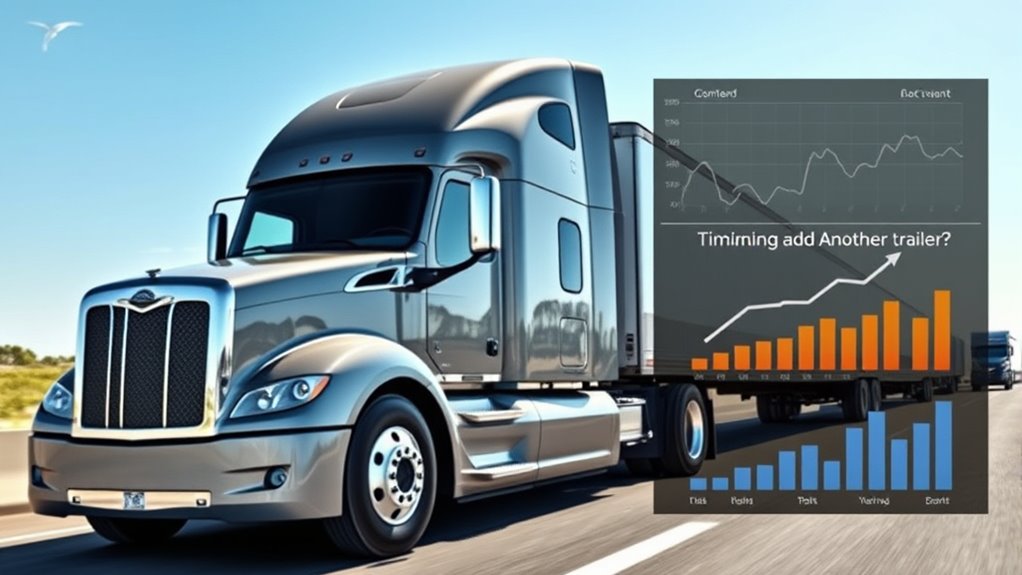To decide when to add another trailer, guarantee your current fleet is well-maintained and your drivers are operating at full capacity. Analyze your demand—if shipment volumes are consistently high or increasing, additional trailers can boost efficiency and reduce delays. Consider your environment and fuel options, especially if sustainability matters. Strategic growth depends on long-term needs, so timing should align with steady demand and available resources. Keep exploring to uncover how you can make the best fleet expansion decision.
Key Takeaways
- Ensure existing trailers are well-maintained and operationally reliable to justify expansion.
- Assess current driver capacity and scheduling to maximize trailer utilization before adding more.
- Analyze shipment demand and delivery schedules to determine if additional trailers can improve throughput.
- Consider environmental impacts and fuel efficiency to align fleet expansion with sustainability goals.
- Evaluate long-term growth plans and costs associated with maintenance, storage, and training before decision-making.

A well-crafted fleet strategy is essential for optimizing your transportation operations and reducing costs. When considering whether to add another trailer, it’s important to evaluate your current operations thoroughly. One key factor to assess is your trailer maintenance schedule. If your existing trailers are consistently in good condition and well-maintained, adding an extra trailer can help you improve efficiency without risking unexpected breakdowns. Conversely, if your trailers frequently require repairs or costly downtime, it might be better to focus on maintaining your current fleet until those issues are addressed. Proper trailer maintenance ensures that your fleet remains reliable, reducing delays and keeping your schedule on track, which makes adding trailers more advantageous.
Effective trailer maintenance ensures fleet reliability and supports strategic fleet expansion decisions.
Driver scheduling also plays a crucial role in making this decision. If your drivers are already operating at or near capacity, adding another trailer can help maximize their productivity. However, if your driver schedules are stretched thin or you’re experiencing driver shortages, adding trailers might lead to underutilized equipment or increased labor costs. Efficient driver scheduling involves balancing workloads so that each driver has enough hours to operate the trailers without risking fatigue or compliance violations. When your driver schedules are optimized, adding a trailer can increase your total throughput, but only if you have enough qualified drivers to handle the additional load.
Another aspect to consider is your current demand and capacity. If your shipments are consistently exceeding your current trailer capacity, adding another trailer makes sense to meet customer expectations and avoid late deliveries. On the other hand, if your volume is steady or declining, investing in more trailers may not be cost-effective. It’s also vital to analyze your routes and delivery schedules. If your routes are fully utilized and adding trailers can reduce deadhead miles or improve turnaround times, then expanding your fleet could be the right move.
Furthermore, understanding the pollution and hydrogen fuel cell implications of your fleet choices can contribute to a more sustainable operation, especially if transitioning to cleaner energy sources aligns with your company’s environmental goals. Lastly, think about your long-term goals and operational flexibility. Adding trailers can increase your capacity, but it also requires investment in maintenance, storage, and driver training. If your fleet strategy aligns with growth and you’ve identified a clear need, then expanding your trailer inventory makes sense. Conversely, if you anticipate seasonal fluctuations or want to keep your fleet lean, it might be better to optimize your current trailers and driver scheduling before expanding.
Frequently Asked Questions
How Do Fuel Costs Influence Trailer Addition Timing?
Fuel costs heavily influence when you add another trailer, as higher fuel prices make fuel economics more crucial. If fuel expenses rise, it might be wise to hold off on adding trailers until efficiency improves or costs decrease. Additionally, consider trailer depreciation; adding too many trailers too soon can lead to higher maintenance and depreciation costs that outweigh fuel savings. Timing your trailer additions ensures ideal operational costs and fuel efficiency.
What Impact Does Trailer Addition Have on Maintenance Schedules?
Adding another trailer is like adding a new piece to a puzzle, impacting your maintenance schedule. It shortens the trailer lifespan for each unit since usage increases, leading to more frequent inspections and repairs. You need to adjust your maintenance scheduling accordingly, ensuring all trailers stay roadworthy. Properly planned, this helps prevent breakdowns, keeps your fleet running smoothly, and extends the overall lifespan of your trailers.
How Do Seasonal Demand Fluctuations Affect Trailer Expansions?
Seasonal demand fluctuations play a vital role in trailer capacity decisions. When demand peaks, you should consider adding trailers to handle the increased load and avoid delays. Conversely, during off-peak seasons, you can reduce trailer capacity to save costs. Monitoring seasonal trends helps you optimize trailer expansion timing, ensuring you meet customer needs without overcommitting resources. Adjusting trailer capacity based on seasonal demand keeps your fleet efficient and responsive.
What Legal Regulations Must Be Considered When Adding Trailers?
When adding trailers, you must consider trailer safety and licensing requirements. Make certain each trailer complies with safety standards like proper brakes, lights, and secure load handling. Verify licensing requirements, including registration, permits, and driver credentials, to avoid legal issues. Staying compliant helps prevent fines and accidents, so always check local and federal regulations before expanding your fleet. Regular safety inspections and proper documentation are essential for smooth trailer additions.
How Can Technology Optimize Trailer Utilization and Fleet Size?
Think of your fleet as a well-tuned orchestra, where every trailer plays its part. Using fleet tracking and data analytics, you can identify when trailers are underutilized or overburdened. This insight helps you optimize trailer deployment, avoiding unnecessary additions. Technology guarantees you hit the right notes—maximizing trailer utilization and determining the perfect fleet size, so your operations run smoothly and efficiently without missing a beat.
Conclusion
By carefully analyzing your operational demands and considering industry benchmarks, you’ll see that adding another trailer isn’t just about capacity—it’s about maximizing efficiency and reducing downtime. Trust the data and your experience; if your current fleet consistently hits its limits or your costs rise, it’s time to expand. Embrace this strategic move confidently, knowing it can boost profitability and streamline your operations. When the signs align, adding another trailer becomes a smart, rewarding decision.









